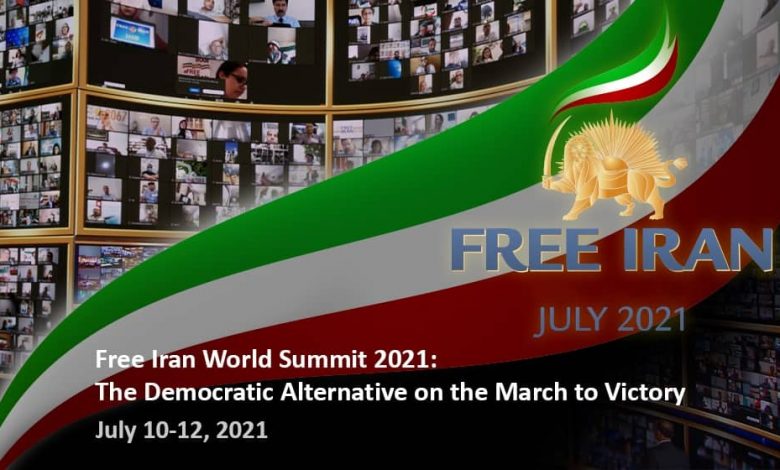Free Iran World Summit 2021: The Democratic Alternative on the March to Victory

Written by
Mohammad Sadat Khansari
The “Free Iran World Summit 2021” organizing committee has announced the dates for its latest rally of Iranian expatriates and political dignitaries. The event is scheduled to begin on Saturday, July 10, and conclude Monday, July 12.
The “Free Iran World Summit 2021” organizing committee has announced the dates for its latest rally of Iranian expatriates and political dignitaries. The event is scheduled to begin on Saturday, July 10, and conclude Monday, July 12.
The committee announced that “Pro-democracy activists inside Iran, lawmakers, former senior government officials, distinguished personalities, and humanitarians and advocates from around the world will take action in solidarity with the Iranian people’s unflinching struggle for freedom.” The schedule for the three-day event are:
Day 1: The Democratic Alternative on the March to Victory
Day 2: Europe – Arab World Stand with the Resistance
Day 3: Global Support for the Iranian People’s Uprising & the Democratic Alternative
This year the Free Iran World Summit 2021 will be held as Ali Khamenei, the regime’s supreme leader has decided to install Ebrahim Raisi, the henchman of the 1988 massacre, as the president of the regime. Raisi was a key element and member of the “Death Committee” in the massacre of more than 30,000 political prisoners in the summer of 1988.
Who is Ebrahim Raisi, a candidate in Iran presidential election and an executioner in 1988 massacre
Khamenei’s action stems from the explosive state of Iranian society, the widespread support for the MEK and its resistance units by the youth for fundamental change in Iran, and the regime’s fear of the people’s uprising to overthrow the regime.
The appointment of the Raisis will also mean the spread of terrorism by the Iranian regime in the region and the world and the continuation of nuclear deception while accelerating the acquisition of nuclear weapons.
Khamenei has concluded that the only way for his regime to survive is to increase internal repression and export terrorism outside Iran, and acquire nuclear weapons. To achieve this goal, he must consolidate the power and bring to power those who are absolutely loyal to him. Thus, the message of Raisi becoming president will be to intensify internal repression, increase terrorism and incitement to war in the region, and accelerate the acquisition of nuclear weapons.
Khamenei’s goal is to consolidate power, and the Iranian people’s goal is to overthrow the entire system and establish a democratic government.
That goal seems well within reach in the wake of the January 2018 and November 2019 uprisings. Although the latter protest movement was suppressed much more quickly and brutally than its predecessor, activist leaders pointed to the regime’s response as a sign of desperation and vulnerability on the part of the regime. In November 2019 uprising, 1,500 participants had been shot dead, and thousands of others were arrested and tortured.
Recalling Iran’s nationwide November 2019 protests after gas price hike
That torture was detailed the following September in a report by Amnesty International. It provided a partial window into the operations of an Iranian judiciary that had been taken over by one of the regime’s most notorious human rights abusers. Ebrahim Raisi was appointed as judiciary chief in March 2019. After being given his mandate by the regime’s supreme leader, Raisi promptly began overseeing an upsurge in corporal punishment, capital punishment, and prosecution of peaceful political activities as national security crimes.
After two years in that role, Raisi is now poised to become the regime’s next president, following a sham presidential election on June 18, which most experts agree is virtually uncontested. All but six other, fairly minor candidates have been barred from standing for election by the Guardian Council. In protest over this situation, as well as the unresolved issues raised by the prior uprisings, many Iranian have resolved to boycott the election while MEK-affiliated resistance units have specifically promoted that decision as a means of “voting for regime change.”
The Organizing Committee anticipates that its July gathering will be largely dedicated to analyzing and discussing the fallout from Raisi’s appointment and the accompanying electoral boycott. In a press conference last week, Mohammad Mohaddessin, chairman of the NCRI’s Foreign Affairs Committee, predicted not only that the boycott would be wildly successful but also that it would lead directly to a “nationwide uprising” that “will be far more intense and widespread than in previous years.”
#Iran: Press Briefing: Mullahs’ Sham Presidential Election | NCRI FAC Chair Mohammad Mohaddessin to brief journalists on the election prospects, its consequences, and the nationwide activities of Resistance #BoycottIranShamElections #MyVoteRegimeChangehttps://t.co/KK6c2kM4uT
— NCRI-FAC (@iran_policy) May 26, 2021
1) In a news briefing on May 26, 2021, Mr. Mohammad Mohaddessin, Chairman of the Foreign Affairs Committee of the #NCRI, spoke about the most recent developments regarding the Iranian regime’s sham Presidential election. #BoycottIranShamElections #Iranhttps://t.co/YaicvgRFiv
— NCRI-FAC (@iran_policy) May 26, 2021
Of course, NCRI officials and allies also generally anticipate that such uprisings will be met with brutal repression, especially if Raisi’s appointment as president remains unchallenged by the international community. As well as overseeing the torture of dissidents and activists following the November 2019 uprising, the current judiciary chief’s legacy is inextricably linked to the leading role that he played in a massacre of 30,000 political prisoners – mainly MEK members and affiliates – during the summer of 1988.
With that in mind, Mohaddessin urged Western policymakers to hold Iranian officials accountable for past crimes against humanity and end the impunity culture surrounding the political ascendance of figures like Raisi. That call to action is sure to be repeated at the Free Iran World Summit 2021, and according to the latest statements from the NCRI, the event will also feature a broader discussion about how the international community can counter the message of support for domestic repression, foreign terrorism, and general belligerence that will be inherent in Raisi’s uncontested election on June 18.

